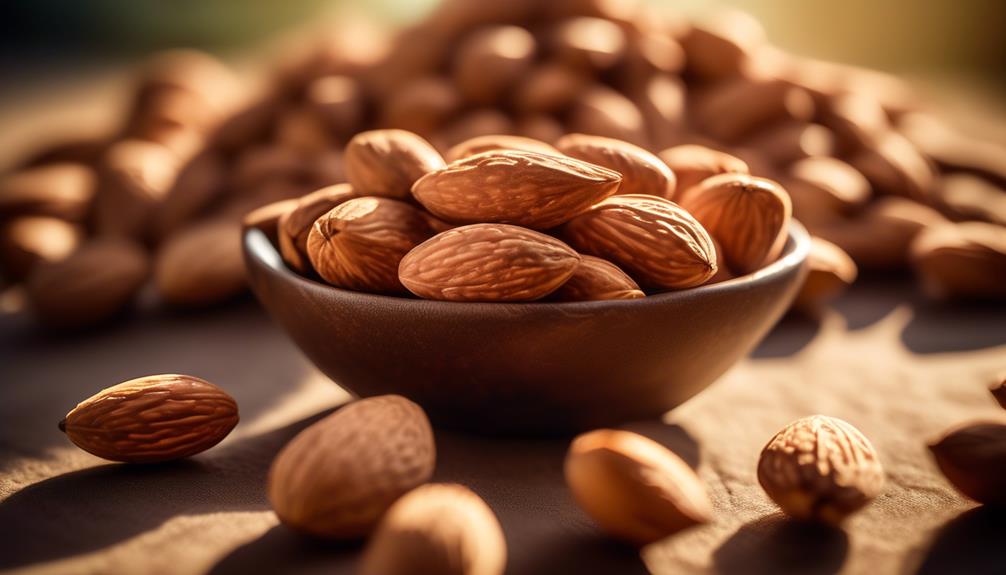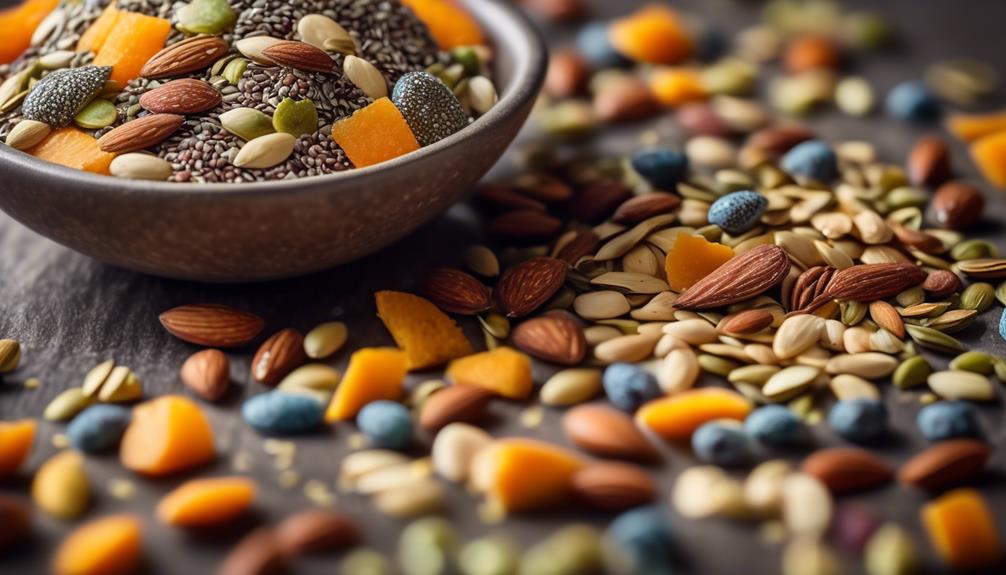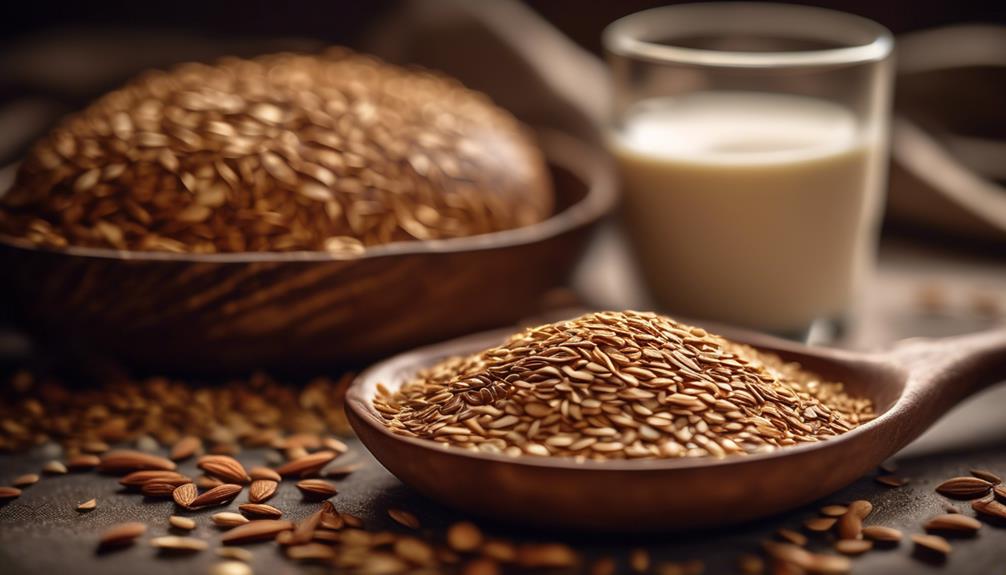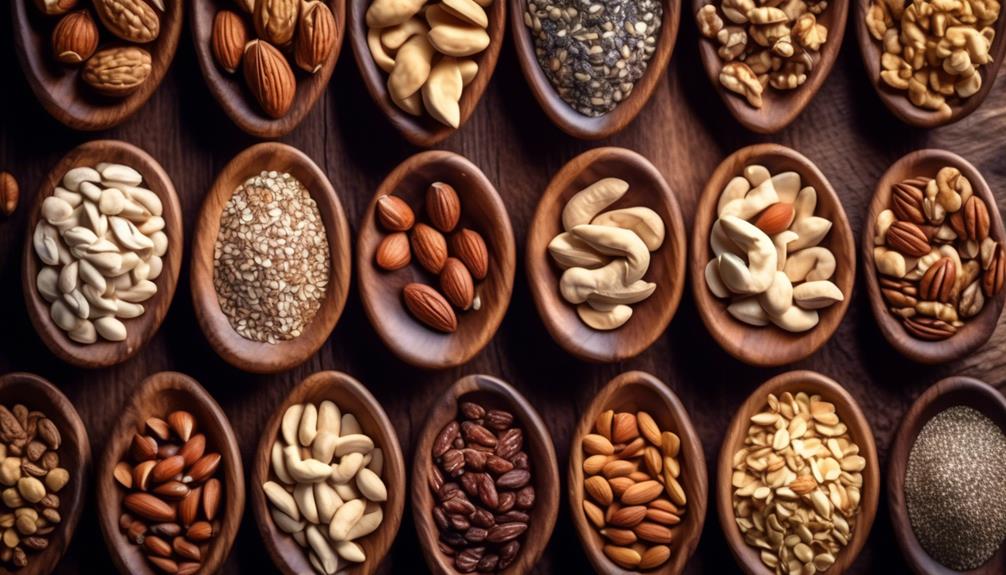Looking to add some variety to your keto diet? Look no further than these 9 best gluten-free nut and seed options.
Almonds, walnuts, pecans, macadamia nuts, chia seeds, hemp seeds, flax seeds, pumpkin seeds, and sunflower seeds – these power-packed ingredients offer a range of flavors and textures that will keep your taste buds satisfied.
But that's not all. Incorporating these nutrient-rich options into your keto lifestyle can also provide numerous health benefits.
So, whether you're seeking a crunchy snack or a versatile ingredient for your favorite recipes, keep reading to discover how these gluten-free nuts and seeds can elevate your keto game.
Almonds

Almonds are a versatile and nutritious option for those following a gluten-free and keto diet. They're packed with essential nutrients such as healthy fats, protein, fiber, vitamin E, and magnesium. Almonds are low in carbohydrates, making them an excellent choice for those on the keto diet. They also have a low glycemic index, which means they've minimal impact on blood sugar levels.
When it comes to incorporating almonds into your keto recipes, the possibilities are endless. You can use almond flour as a substitute for regular flour in baking, making it easier to create delicious keto-friendly treats like almond flour bread, cookies, and pancakes. Almonds can also be used to make homemade almond milk, which is a great dairy-free alternative for those on a keto diet.
Another way to enjoy the benefits of almonds on a keto diet is by snacking on them in their raw or roasted form. You can also incorporate them into your salads, stir-fries, or even make almond butter to spread on keto-friendly bread or use as a dip for vegetables.
Walnuts
When it comes to walnuts, you'll be pleased to know that they offer numerous health benefits. These nutrient-dense nuts are packed with antioxidants, omega-3 fatty acids, and fiber, making them a great addition to your keto diet.
Not only can you enjoy walnuts as a snack on their own, but they can also be incorporated into various dishes, adding a delicious crunch and nutty flavor.
Health Benefits of Walnuts
Walnuts offer numerous health benefits, making them a valuable addition to a gluten-free and keto-friendly diet. Packed with nutrients, walnuts are an excellent source of omega-3 fatty acids, antioxidants, and fiber. These nutrients have been linked to various health benefits, including improved heart health, reduced inflammation, and enhanced brain function.
Cooking techniques for walnuts include toasting, roasting, or incorporating them into baked goods, salads, or as a topping for yogurt or oatmeal. Additionally, walnuts can be used in unique recipes such as walnut pesto, walnut-crusted chicken, or as a base for gluten-free and keto-friendly energy bars.
Cooking With Walnuts
To enhance the flavor and nutritional value of your dishes, consider incorporating the versatile and nutrient-rich walnuts into your cooking repertoire.
Walnuts can be used in a variety of cooking techniques to add a delicious crunch and depth of flavor to your meals. They can be chopped and sprinkled over salads, roasted and added to stir-fries, or ground into a paste to use in sauces and dressings.
When it comes to flavor pairing, walnuts work well with both sweet and savory dishes. They complement fruits like apples and pears, and can also be paired with cheese and dark chocolate for a satisfying dessert or snack.
Nutritional Value of Walnuts
One important aspect to consider when incorporating walnuts into your cooking is their impressive nutritional value. Here are four key reasons why walnuts are a great addition to your diet:
- Rich in healthy fats: Walnuts are packed with omega-3 fatty acids, which are essential for brain health and reducing inflammation.
- Excellent source of antioxidants: Walnuts are high in antioxidants like vitamin E, which help protect your cells from damage caused by free radicals.
- High in fiber: Walnuts are a good source of dietary fiber, promoting healthy digestion and helping to regulate blood sugar levels.
- Nutrient-dense: Walnuts contain important minerals like magnesium, copper, and manganese, as well as vitamins B6 and folate.
Pecans
Pecans aren't only delicious, but they also offer numerous health benefits. They're rich in healthy fats, fiber, and antioxidants, which can support heart health and reduce inflammation. Additionally, pecans are a good source of minerals like magnesium and zinc.
With their sweet and buttery flavor, pecans can be enjoyed on their own as a snack, added to salads, or used as a topping for desserts.
Health Benefits of Pecans
With their numerous health benefits, pecans provide a valuable addition to a gluten-free and keto diet. Here are four reasons why you should consider incorporating pecans into your diet:
- Heart Health: Pecans are rich in monounsaturated fats, which have been linked to lower levels of bad cholesterol and reduced risk of heart disease.
- Nutrient Powerhouse: Pecans are packed with essential nutrients like vitamin E, manganese, and magnesium, which play a crucial role in supporting overall health and wellbeing.
- Antioxidant Boost: Pecans are a great source of antioxidants, such as flavonoids and phenolic compounds, which help protect against oxidative stress and inflammation in the body.
- Blood Sugar Control: Despite being high in fat, pecans have a low glycemic index, meaning they've minimal impact on blood sugar levels. This makes them an excellent choice for individuals following a keto or diabetic-friendly diet.
Incorporate pecans into your meals and snacks to enjoy their health benefits while adding a delicious crunch to your dishes. Try them in salads, smoothies, or as a topping for roasted vegetables for a creative twist.
Nutritional Profile of Pecans
To gain a better understanding of the nutritional benefits of pecans, it's important to examine their composition and nutrient content. Pecans are packed with essential nutrients that can contribute to a healthy diet. They're an excellent source of healthy fats, particularly monounsaturated fats, which are beneficial for heart health.
Pecans also provide a good amount of protein, fiber, and various vitamins and minerals, including vitamin E, magnesium, and zinc. These nuts are low in carbohydrates, making them a suitable option for those following a keto diet.
In terms of culinary uses, pecans are versatile and can be enjoyed in various ways. They can be eaten as a snack, added to salads or baked goods, or used as a topping for oatmeal or yogurt. Incorporating pecans into your diet can provide you with not only a delicious flavor but also valuable nutritional benefits.
Creative Ways to Use Pecans
Incorporating pecans into your culinary repertoire opens up a world of creative possibilities. Not only are pecans delicious, but they also come with a range of health benefits. Here are four creative recipes that showcase the versatility of pecans:
- Pecan-crusted chicken: Crush pecans and mix them with breadcrumbs and your favorite seasonings. Dip chicken breasts in beaten eggs, then coat them in the pecan mixture. Bake until golden brown for a crunchy and flavorful twist on traditional chicken.
- Pecan pesto: Blend pecans, fresh basil, garlic, Parmesan cheese, and olive oil until smooth. Use this nutty and aromatic pesto as a spread for sandwiches, a topping for grilled vegetables, or a sauce for pasta dishes.
- Pecan butter: Roast pecans and blend them in a food processor until creamy. Spread pecan butter on toast, use it as a dip for fruit, or incorporate it into your favorite baked goods for a rich and nutty flavor.
- Pecan granola: Mix rolled oats, chopped pecans, honey, coconut oil, and your choice of dried fruits and spices. Bake until golden and crispy for a homemade granola that adds a satisfying crunch to your breakfast or snacks.
With these creative pecan recipes, you can enjoy the health benefits of pecans while adding a unique and delicious touch to your meals.
Macadamia Nuts
Macadamia nuts are a popular choice for those following a gluten-free and keto diet due to their rich flavor and high fat content. These nuts aren't only delicious, but they also offer several benefits.
Macadamia nuts are a great source of healthy monounsaturated fats, which can help improve heart health by reducing bad cholesterol levels. They're also packed with important nutrients such as vitamin B1, magnesium, and copper, which play a crucial role in maintaining overall health.
In addition to their health benefits, macadamia nuts can be used in a variety of delicious recipes. One popular option is macadamia nut butter, which can be spread on gluten-free bread or used as a dip for vegetables. Another tasty recipe is macadamia nut-crusted chicken, where the nuts are ground into a flavorful coating for the chicken. You can also add macadamia nuts to your favorite salad for an extra crunch and nutty flavor.
Chia Seeds

If you're looking to explore more gluten-free and keto-friendly options, chia seeds are an excellent choice. These tiny seeds are packed with nutrients and can be easily incorporated into your diet in various ways. Here are four reasons why chia seeds are a great addition to your gluten-free and keto lifestyle:
- High in fiber: Chia seeds are an excellent source of fiber, which is essential for maintaining a healthy digestive system. Just one ounce of chia seeds contains a whopping 10 grams of fiber, helping to keep you feeling full and satisfied.
- Omega-3 fatty acids: Chia seeds are one of the best plant-based sources of omega-3 fatty acids. These healthy fats are crucial for brain health and reducing inflammation in the body.
- Versatile ingredient: Chia seeds can be used in a variety of recipes, making them a versatile addition to your gluten-free and keto pantry. You can sprinkle them on top of salads, blend them into smoothies, or use them as an egg substitute in baking.
- Easy to prepare: Chia seeds absorb liquid and form a gel-like consistency when soaked. This makes them an easy ingredient to work with and adds a unique texture to your dishes.
Incorporating chia seeds into your gluten-free and keto diet is a simple and delicious way to boost your nutrient intake. Try experimenting with chia seed recipes to discover new and exciting ways to enjoy these nutritious seeds.
Hemp Seeds
Hemp seeds offer a gluten-free and keto-friendly option that's packed with nutrients. These tiny but mighty seeds are derived from the hemp plant and offer numerous health benefits.
One of the key advantages of hemp seeds is their high protein content. These seeds are a complete source of protein, meaning they provide all nine essential amino acids that your body needs. This makes them an excellent choice for individuals following a plant-based or vegan diet.
In addition to their protein content, hemp seeds are rich in healthy fats, particularly omega-3 and omega-6 fatty acids. These essential fats play a crucial role in brain function, heart health, and reducing inflammation in the body.
Moreover, hemp seeds are a great source of fiber, which can aid in digestion and promote feelings of fullness.
When it comes to incorporating hemp seeds into your keto diet, the possibilities are endless. You can sprinkle them on top of salads, yogurts, or smoothies for an added nutritional boost. They can also be used in baking or as a topping for roasted vegetables. With their mild, nutty flavor, hemp seeds can easily complement a wide range of dishes.
Flax Seeds

Flax seeds, also known as linseeds, are a versatile and nutritious gluten-free option for those following a keto diet. Here are four reasons why you should consider incorporating flax seeds into your diet:
- Rich in Omega-3 fatty acids: Flax seeds are one of the best plant-based sources of omega-3 fatty acids, which are essential for brain health and reducing inflammation in the body.
- High in fiber: Flax seeds are packed with dietary fiber, which aids in digestion and helps maintain a healthy gut. This can be particularly beneficial for individuals on a keto diet, as fiber can help prevent constipation and promote regular bowel movements.
- Low in carbohydrates: Flax seeds are low in carbs, making them an excellent choice for those following a keto diet. They can be used as a replacement for breadcrumbs in recipes, or ground up and used as a flour substitute in baking.
- Versatile in recipes: Flax seeds can be incorporated into a variety of recipes, such as smoothies, salads, and baked goods. They can be ground into a powder or used whole, depending on the desired texture and taste.
Incorporating flax seeds into your keto diet can provide numerous health benefits, from boosting your omega-3 intake to improving digestion. Try adding flax seeds to your favorite recipes or explore new flax seed recipes to enjoy their nutritional benefits.
Pumpkin Seeds
Pumpkin seeds are a nutritious and gluten-free option that you can easily incorporate into your keto diet for added health benefits. These small seeds are packed with essential nutrients that can support overall well-being.
One of the great things about pumpkin seeds is their versatility. You can enjoy them as a snack on their own or incorporate them into various recipes. Roasting pumpkin seeds with a sprinkle of salt and spices can create a delicious and satisfying snack. You can also add them to salads, smoothies, or even use them as a topping for soups and stews.
Aside from being a tasty addition to your meals, pumpkin seeds also offer several benefits for your hair. They're a rich source of nutrients like vitamin E, zinc, and omega-3 fatty acids, which can promote hair growth and improve overall hair health. These nutrients help to strengthen hair follicles, reduce hair loss, and add shine to your locks.
Incorporating pumpkin seeds into your keto diet not only provides you with a tasty and nutritious snack option, but also offers potential benefits for your hair. So, go ahead and enjoy these delicious seeds to support your overall health and hair wellbeing.
Sunflower Seeds

Sunflower seeds are a versatile and nutritious option that can be easily incorporated into your keto diet for added health benefits. Here are four reasons why you should consider adding sunflower seeds to your keto meal plan:
- Rich in healthy fats: Sunflower seeds are a great source of healthy fats, including monounsaturated and polyunsaturated fats. These fats help promote satiety, control blood sugar levels, and support heart health.
- Packed with essential nutrients: Sunflower seeds are a nutrient powerhouse, providing essential vitamins and minerals such as vitamin E, magnesium, and selenium. Vitamin E acts as a potent antioxidant, protecting your cells from damage caused by free radicals.
- Good source of plant-based protein: Sunflower seeds are an excellent plant-based protein option for individuals following a keto diet. Protein is essential for muscle repair and growth, as well as supporting a healthy immune system.
- Versatile ingredient for recipes: Sunflower seeds can be used in a variety of keto-friendly recipes. You can sprinkle them on salads, add them to homemade granola, or use them as a topping for roasted vegetables. Their nutty flavor and crunchy texture make them a delicious addition to your meals.
Incorporating sunflower seeds into your keto diet not only adds a satisfying crunch but also provides numerous health benefits. Try incorporating them into your favorite recipes to enhance both the flavor and nutritional profile of your meals.
Conclusion
In conclusion, these 9 gluten-free nut and seed options are perfect for those following a keto diet.
Incorporating almonds, walnuts, pecans, macadamia nuts, chia seeds, hemp seeds, flax seeds, pumpkin seeds, and sunflower seeds into your meals can provide you with a rich source of healthy fats, protein, and essential nutrients.
Enjoy these delicious and nutritious options while staying on track with your keto lifestyle.







